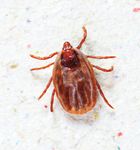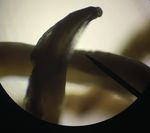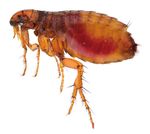Parasite Forecast - UK & lreland - ESCCAP UK & Ireland
←
→
Page content transcription
If your browser does not render page correctly, please read the page content below
Welcome Summer 2021 Fleas ESCCAP UK & Ireland supports a risk-based approach to
Parasite Forecast
prevention and information regarding regional prevalence is key to
The Big Flea Project has found this. Routine testing of dogs for A. vasorum alongside those dogs
Welcome to the ESCCAP UK & Ireland with relevant clinical signs enables practices to establish if
28.1% of cats and 14.4% of dogs
quarterly newsletter. For many of us A. vasorum is present in their area as well as demonstrating
Exotic disease in imported positive for fleas. efficacy of control plans if dogs are already on preventative
this summer, staycations and day trips dogs from eastern and treatment. Research has recently been published confirming
mean that we can enjoy different parts southern Europe.
https://parasitesandvectors.biomedcentral.com/ the infectivity of L3 Angiostrongylus vasorum and Crenosoma
articles/10.1186/s13071-019-3326-x
of the wonderful countryside the British vulpis larvae shed from gastropods https://parasitesandvectors.
Isles have to offer. Risk assessments As the number of imported 11.3% of these infested pets were found to be harbouring biomedcentral.com/articles/10.1186/s13071-021-04802-6 . While
fleas infected with Bartonella and 5% with Rickettsia felis, both the significance of this route in field conditions is still unknown,
are important for parasite exposure rescue dogs remains high this study demonstrates the potential for dogs to be infected from
zoonotic pathogens. They are of particular significance in the
and increased movement around the throughout the current crisis, it is immunosuppressed, making flea control vital in these groups, slime trails and water visited by slugs. As well as preventative
country and seasonal changes in our vital that vets and nurses remain especially if self-isolating. More data from The Big Flea Project treatment for dogs whose geographical location and lifestyle puts
has been published demonstrating the importance of pet owner them at risk from exposure from A. vasorum, simple precautions
activity, means that the risk of parasite vigilant for clinical signs that such as bringing in toys, food and water bowls indoors at night
education and compliance in adequate flea control https://
exposure also changes. might indicate exotic parasite onlinelibrary.wiley.com/doi/abs/10.1111/mve.12462. A wide range and avoiding walking after periods of rain (not always easy in the
infection and that relevant of treatment outcomes, in regard to flea control, was observed UK!) will also help to minimise any risk of transmission via this
Many parasites are only present in certain parts of the country, sometimes in small across a variety of products. As there is still no evidence of flea route. Although not as common as Angiostronglyus vasorum,
foci and even for those present throughout the UK, prevalence can vary significantly
screening tests are carried out. Crenosoma vulpis is endemic in the UK and should be considered
resistance causing flea control breakdown in the field, it is likely
from place to place. Knowing where parasites are is crucial when assessing exposure that compliance and owner education is playing a significant as a differential in coughing dogs, as demonstrated by a recent
risk where pets live and where they plan to travel. Routine diagnostic testing in cats part in these differences. The study emphasises the importance case highlighted in the Vet Times https://www.vettimes.co.uk/
and dogs forms an essential part of establishing national distribution of parasites but of continued monitoring for efficacy of flea treatments alongside news/dog-survives-despite-lungs-being-full-of-worms/.
also helps veterinary professionals gauge parasite risk in their local area. ESCCAP owner engagement and education. Year-round flea treatment for Risk factors for exposure are similar to those for A. vasorum,
UK & Ireland’s support for veterinary practices: looking to carry out intestinal parasite cats and dogs remains essential because: as are approaches to treatment and prevention.
prevalence studies and its new recommendations for screening imported dogs for
parasites, are the latest steps in helping support practices in turning routine testing in 1. Exposure to fleas is ubiquitous with no single group of pets
the UK into reality. being at significantly decreased risk compared to others.
If anyone has any ideas to promote increased parasite testing in practice,
2. Exposure occurs all year round and if you wait until flea
please get in touch. We welcome any query, large or small, via our website at
infestations establish, then they take months to eliminate,
www.esccapuk.org.uk. resulting in increased morbidity and discomfort for pets and
The newsletter aims to keep veterinary practices, industry and academia up to date owners as well as increased zoonotic pathogen exposure.
with our activities so if there is anything you would like us to include, feel free to
contact us at www.esccapuk.org or email me at info@esccapuk.org.uk. 3. If veterinary professionals don’t recommend year-round
flea treatment for cats and dogs, then infestations will
Similarly, if you would like to contribute a case report or inform us about anything in occur leading to many pet owners seeking flea products
relation to our next forecast, please contact us. elsewhere, often without correct application advice
(how to apply without spillage, avoiding swimming,
Leishmania amastigotes (Image courtesy of Pedro Serra/NWL labs) shampooing etc.) leading to more environmental
To your parasite control success! contamination and not less.
Heartworm and Leishmania cases reported to
ESCCAP UK & Ireland continue to be imported
Ian Wright
Head of ESCCAP UK & Ireland
from a wide variety of countries, both inside and Lungworm
outside Europe. A case of Thelazia callipaeda
infection was highlighted in the Vet Times Warm and humid weather is likely to
showing that this parasite remains endemic in result in increased slug activity. Veterinary Ixodes ricinus
southern and eastern Europe and is likely both
under-diagnosed and under-reported. professionals should therefore continue
https://www.vettimes.co.uk/news/vet-
to be vigilant for cases of Angiostrongylus Tick-borne disease
discovers-rare-zoonotic-eye-endoparasite-in- vasorum in their area and advise preventative
Tick-borne encephalitis virus has established in
labrador-retriever-patient/ treatment for high-risk dogs (previously
the UK.
ESCCAP UK & Ireland continues to recommend infected, living in close proximity to other
four key steps (the “four pillars”) in all imported cases, coprophagic and those that eat slugs, https://www.bbc.co.uk/news/health-50206382
dogs. These are:
snails, grass and amphibians). While pets and their owners should continue to enjoy the
beautiful New and Thetford forests where there is evidence of
1. Checking for ticks and subsequent
identification.
establishment, the need for effective tick prevention has never
been more important for those pets and people either working
2. Treating dogs with praziquantel within 30 there or using the areas for regular recreational activity. The UK
days of returning to the UK in addition to climate continues to allow questing and feeding of Ixodes ticks
the compulsory treatment, and treating for all year round, with high levels of activity throughout the summer
ticks if a tick treatment is not in place. (http://veterinaryrecord.bmj.com/cgi/content/full/vr.104649).
Checking for and removing ticks within 24 hours and using an
3. Recognising clinical signs relevant to effective product that will rapidly kill or repel ticks, will greatly
UK & diseases present in the countries visited reduce the risk of transmission for pets and owners walking in high
lreland
or country of origin. risk areas such as outdoor areas with tall grass, bracken and those
shared with deer or ruminants. Pets with a previous history of tick
Parasite Forecast 4. Screening for Leishmania, heartworm and exposure should also be treated as it is likely their lifestyle will
Issue 16 / Summer 2021 exotic tick-borne disease in imported dogs. expose them to ticks again in the future.
While every care is taken to ensure accuracy, ESCCAP UK & Ireland cannot accept liability for errors or ommissions.
Graphic design: www.nerd.design
Crenosoma vulpis adult (Image courtesy of Alistair Cox) continued on next page
Email: info@esccapuk.org.uk / Website: www.esccapuk.org.ukcontinued from previous page Latest news from ESCCAP UK & Ireland
Toxocara canis Echinococcus granulosus
There remains no current data on the prevalence Although there is evidence for the presence Imported dog testing
or incidence of human toxocarosis in the UK. of E. granulosus in England and mainland
Recorded prevalence of patent infection in Scotland, its distribution outside of endemic foci
recommendations
untreated UK adult cats and dogs however, in Wales and the Western Isles of Scotland is In response to increasing numbers of questions
continues to be high (5% dogs, 26% cats unknown. Post-mortem inspections in abattoirs regarding parasite screening in imported pets
among most recent figures from Lancashire and across Britain have produced positive cases and ahead of the new ESCCAP pet travel and
6% dogs, 32% cats among most recent figures with a particularly high incidence on the Welsh importation guideline (due spring 2022), ESCCAP
from Ireland). border and in the north Midlands. UK & Ireland has published the following list of
HyData UK is a multi-centre collaborative study investigating the parasites and tests we would recommend for all
national distribution of E. granulosus in high-risk dog populations imported dogs:
Cutaneous skin lesions associated with leishmaniosis
(hunting hounds, farm dogs and pet dogs in rural areas), livestock (Image courtesy of Pedro Serra/NWL labs)
(cattle, sheep) and horses at slaughter in England, Wales, Leishmania – quantitative serology, PCR
Scotland and Northern Ireland. Using a molecular epidemiological Heartworm – antigen blood test, Knott’s test
approach and GIS methodology, the study aims to build a more
comprehensive picture of E. granulosus geographic distribution in Ehrlichia canis and Anaplasma – serology, PCR
the UK. Until these results become available, prevention advice to
Hepatozoon canis – blood smear, PCR
pet owners must be based on lifestyle risk of the pet, including:
Babesia – PCR
1. Monthly treatment with praziquantel of all dogs in known
Brucella canis – consult your external lab for a suitable test
hydatid endemic areas unless kept on leads and fed cooked
diets. Leishmania and heartworm testing should be repeated 6 months
later if initial tests are negative or if relevant clinical signs develop.
2. Monthly treatment with praziquantel for any dogs outside
these areas shedding Taenia tapeworm segments (the risk Many of the tests in this list can be performed economically
factors for Taenia and E. granulosus infection are broadly the through PCR packages or patient-side testing. A thorough clinical
same), fed raw offal/unprocessed raw diets or have access to exam is also essential to identify relevant clinical signs and to look
fallen livestock. for evidence of gross worm infestation such as Thelazia callipaeda
(eyeworm), Dirofilaria repens (skin worm) and Linguatula serrata
3. Praziquantel treatment at least 4 times a year for dogs (nasal pentastomid). Ehrliciha canis morula (Image courtesy of Pedro Serra/NWL labs)
Toxocara adult worm (Image courtesy of Pedro Serra/NWL labs) in non-endemic areas that are out of sight off-lead with
potential access to pasture.
Due to the zoonotic risk this represents, and the potential for all 4. Promotion of anti-dog fouling, keeping dogs on leads
cats and dogs to be infected, ESCCAP UK & Ireland continues
ESCCAP UK & Ireland statement of principal
around farms and livestock, and promotion of adequately
to advise that all UK cats and dogs are treated at least every 3 frozen or cooked diets.
months to reduce egg shedding and high risk groups (those cats
and dogs on raw unprocessed diets, those that hunt, those living
with children or immunocompromised adults) should be treated
monthly. A recent survey of UK pet owners suggests that worm We have put out
treatment frequency in cats and dogs is much lower than this
Subscribe! a statement of
https://parasitesandvectors.biomedcentral.com/articles/10.1186/ “ESCCAP UK & Ireland is committed to risk-based and sustainable
To subscribe to future editions of
principal on the use use of parasiticides, which should always be used in a manner that
s13071-020-04086-2. Routine testing for intestinal parasites is
important to help fill national data gaps in worm prevalence while
Parasite Forecast, please email of parasiticides in optimises the benefits to animal health and welfare, human health
info@esccapuk.org.uk
also demonstrating the efficacy of current treatment plans. companion animals and the environment following One Health principles.
on the home page A risk-based approach should be used to assess the parasite
of our website. prevention needs of individual pets using geographic, lifestyle
and household factors where this information is available.
Latest news from ESCCAP UK & Ireland This is to emphasise Risk-based application may, in some circumstances, require
long-term prophylactic treatment, where risk is known to be high.
our commitment
to evidence-based Routine diagnostic testing is vital in practice to both assess the efficacy
Support for intestinal parasite studies preventative treatment
of parasite prevention plans and to generate data on which a risk-based
approach can be based. ESCCAP UK & Ireland continues to evolve its
but also to make parasite control advice as new data becomes available.
Cat and dog faecal testing for intestinal parasites is becoming more achievable with faecal antigen the case for its use, We also reiterate the need for pet owners to follow
testing from IDEXX and the Imagyst system for faecal flotation from Zoetis. We are offering to help where indicated by prescribing and product datasheet advice.”
practices interested in running in-house prevalence studies for intestinal parasites as highlighted in current evidence.
the Vet Record.
https://bvajournals.onlinelibrary.wiley.com/doi/10.1002/vetr.480
Prevalence studies are important to assess, both regionally and nationally, how common these parasites are and the risks they pose to animal
and human health. For more information, please contact ESCCAP UK & Ireland via our website.ESCCAP UK & Leishmania
Ehrlichia canis
Ireland Enquiries Linguatula serrata
Pet travel requirements
Babesia canis/Dermacentor
Anaplasma spp.
ESCCAP UK & Ireland has Drug reactions/cross reactions
Myiasis
continued to receive a large Flea control
number of queries from veterinary Giardia
professionals and the general public Heartworm (Dirofilaria immitis)
regarding a wide range of subjects Dirofilaria repens
Hookworm
over the last three months. Lungworm (A. vasorum)
Ticks/Lyme disease
Queries regarding management of
Rhipicephalus tick
Leishmania infantum and heartworm house infestation
predominate once more as numbers of Toxocarosis
imported rescue dogs from endemic Raw diets
countries remain high. As COVID-19 travel Dog tapeworms
restrictions are gradually lifted, queries Cat tapeworms
Parasitology CPD
regarding pet travel requirements are also
Hepatazoon canis
increasing. Some of these concern the
Neospora spp.
compulsory tapeworm treatment required
Crenosoma vulpis
to travel to and from Northern Ireland and Distemper
the rest of the UK. As no part of the UK Cat lungworm
is currently endemic for Echinococcus Anthelmintic resistance
multilocularis, this treatment makes Worm treatment in pregnant bitches
no sense and is likely to result in over- Backyard poultry parasites
treatment given the frequency of dog travel Thelazia callipaeda
between the two areas. It is however, for the Ringworm
moment, a legal requirement. The warm, Isospora canis
Hyalomma ticks
humid late spring and early summer has
Horse worms
led to increased tick activity with numerous
Cryptosporidium spp.
tick-related questions arising as a result.
Brucella canis
Selection of preventative treatments and Tick-borne encephalitis
risk of exposure to tick-borne pathogens Faecal egg counts
have been of particular concern. Spirocerca lupi
Trichuris vulpis
-10 -5 0 5 10 15 20 25
Number of enquiries this quarter
Change compared with previous quarter
ESCCAP UK & Ireland Supporters 2021
Sponsors: Donors: Fellowships:
www.esccapuk.org.ukYou can also read



























































